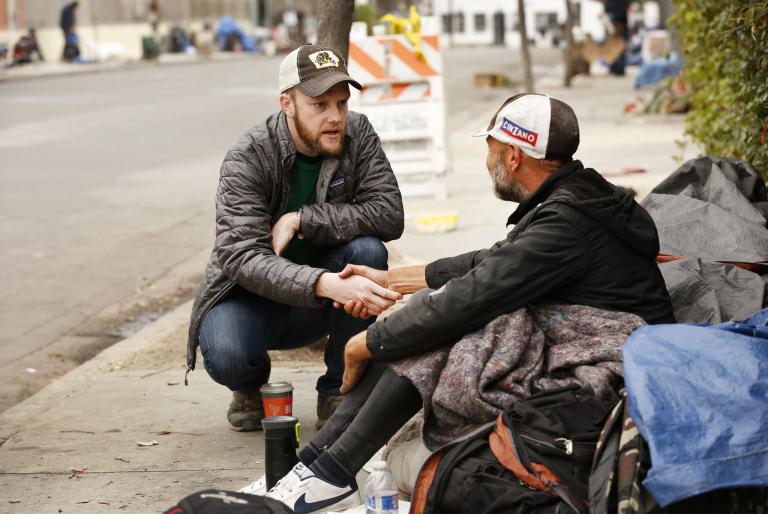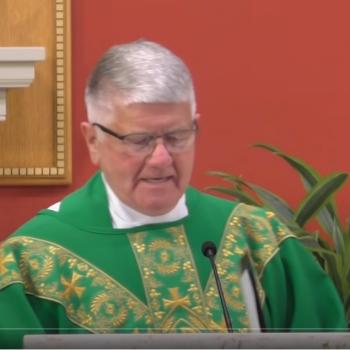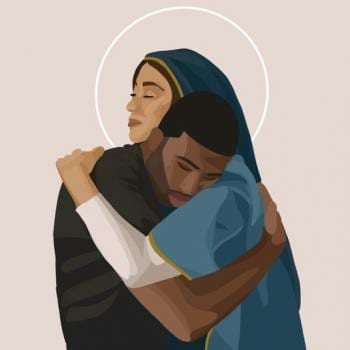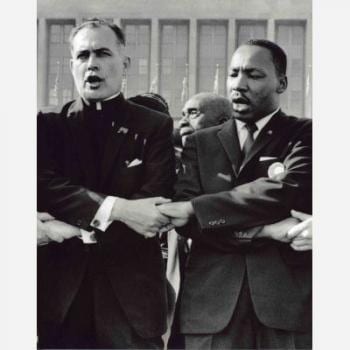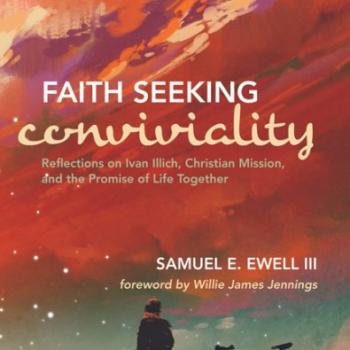This essay by Audrey Davis originally appeared in Radically Catholic in the Age of Francis. A former Catholic Worker and Social Justice Ministries Coordinator for the Diocese of Fort Wayne-South Bend, Audrey is currently a lead organizer with Faith in Indiana.
Francis is challenging 21st Century Catholics to break beyond the limits of “serving” the poor. We must remember them as our friends.
For decades now, American Catholics have been being told that they should care for the poor. The liturgical calendar itself invites parish priests to posture about our duties to the least among us at least every Lent, confirmation Mass, missionary week, stewardship campaign and Peter’s Pence collection. With the poverty that came with being immigrants to this country residing somewhere in our distant memory, we’ve been attempting to balance a sense of guilt and responsibility toward the poor with our pursuit of greater education and influence. A small, dedicated minority of Christians work daily with the poor, going through the hard work of dialoging the Gospel with life.
The rest of us tidily sum up our social responsibility and devotion to the common good as the letters we write to our congressmen in defense of the right to life, the sanctity of marriage, and religious freedom, and perhaps the donations to charities and volunteer hours we slate in alongside work, children’s dance recitals, hair appointments, and vacations as normal. The potential agape has in transforming our daily priorities remains untapped, while, for a good majority of us, the energy we have to devote to “loving thy neighbor” is expended by the time our SUVs or mini-vans make it through the parking lot after Sunday Mass.
Far beyond the American way of guilting, incentivizing, or competitive-izing what we can do for the poor, Pope Francis emphasizes what they can do for us. “Men of good will,” he says, “must work, each with his own strengths and expertise, to ensure that love for others increases until it is equal and possibly exceeds love for oneself.”[1] The healing of the world’s woundedness will come about not through creating some amazing non-profit, promoting a grand, sweeping movement, or crafting amazing talking points, he proposes. Rather through a series of amazingly personal undertakings by each of us.
Focus not on knowing about poverty, but on experiencing poverty, and knowing the poor.
This is why I want a Church which is poor and for the poor. They have much to teach us. … In their difficulties they know the suffering Christ. We need to let ourselves be evangelized by them. (Evangelii Gaudium 198)
Think how much better the world would be if all the people talking about poverty and hunger were actually hungry and poor. There are currently over 2.1 million tax exempt/nonprofit organizations in our country, with assets of over $7 trillion dollars and income of over $3 trillion![2] Christian outreaches make up a good portion of them. But, unless we are especially mindful about practicing subsidiarity, involving those most affected by the issue in its solution, those who are involved in the messiest of life’s circumstances are the least likely to be heard in the conversations about them.
This came into stark realization for me a little over a year ago, after moving abruptly from a Catholic Worker community. After a series of events that proved the frailty of the intention to serve the poor outside of community, I moved back to my hometown and, at least for the foreseeable future, cut communications with many of my closest friends. Exhausted and alone, I was completely confounded with how to incorporate voluntary poverty and a desire to be available to the weak and unseen with the pursuit of stability in life — a stability I desperately needed to start finding. An old friend had provided me with a calm, judgment-free space in her basement to stay for however long I needed. I had no means of transportation, no real income, and was in the throes of a deep depression. While I had, for years, prided myself on being an advocate for the working poor, I had not, since youth, counted myself as one of them.
Once I finally got a car, I needed a job. I leveraged the three years I spent studying in Italy to get a waitressing job at an Italian restaurant. There were multiple days I ate all three meals in my car, working up to 4 double-shifts a week. On Tuesdays I rushed to the Veterans Hospital directly after work for therapy, noticing the stares in the lobby as the restaurant stench that clang to my uniform filled the air around me. I learned more about poverty during those months of limbo than I had in any of my time studying development and social change in college, organizing international symposiums on markets, culture and ethics in Rome, or volunteering for the “under-served” in urban epicenters.
Dorothy Day once said “We need always be thinking and writing about poverty, for if we are not among its victims its reality fades from us. We must talk about poverty, because people insulated by their own comfort lose sight of it.”[3] And, this is what has happened to most Americans in their attitude toward the poor today. Whether parents, janitor workers, or doctors, once we’ve gone through the hard work of making sense of the world and the pain it has caused us, we tend to cling tightly to the identity we take on for ourselves.
But, God wants to replace our hearts of stone with human hearts. Encountering the poor proves the tenuousness of what we’ve latched onto as our identity if our identity is anything more or less than Christ alone. Anyone who’s been, or sat with, a convict, addict, immigrant, child suffering the loss of a parent, cancer patient, or single mother knows this tenuousness. It is the kind that strips away the layers of distinction and membership we use throughout the rest of the day to get things done or claim our plot. And, we just sit there. Sit in the ambiguity of being tossed from place to place; being unable to communicate or being willfully ignored; feeling an insidious skepticism toward life and wondering how you’ll make it through another week. It leaves little more than two raw and vulnerable people, trying to understand their experience. This is where Jesus is found. To join in union with the poor, to see the merit of poverty, and to become poor oneself means to seek out opportunities to shed the identity we’ve built for ourselves that has made us austere and certain, and become, like Christ, more approachable, open, and grateful.
Look not for big, glossy moments of change, but for opportunities to join in the rawness of everyday life.
It is essential to draw near to new forms of poverty and vulnerability, in which we are called to recognize the suffering Christ, even if this appears to bring us no tangible and immediate benefits. I think of the homeless, the addicted, refugees, indigenous peoples, the elderly who are increasingly isolated and abandoned, and many others. (Evangelii Gaudium 210)
I met Jeneth in a big moment. She had just been released from prison on house arrest after 20 years, and my work in jail ministry for the diocese of the 14 counties of Northeast Indiana had just begun. I would feverishly scribble down the stories she shared each time we met. Her path from drugs and homicides to praying daily, following the Big Book method of recovery, and wanting to start her own ministry for at-risk youth would be a great train to catch for introducing my name in the social justice community, I thought. Even with such skewed intentions, I was able to just sit and listen. She would belt out the lyrics of Kirk Franklin songs while rolling a cigarette, sharing memories of her family, abuse, drugs, prison. She beamed with excitement after court hearings, the completion of appointed rehab programs, or at the chance meeting of one of her former cell-mates, now also trying to transform her skill set to, what Jeneth called, “hustling for Jesus.”
She carried around multiple notebooks at all times, keeping all of her paperwork, prescriptions and passes alongside her strategic plan for the transitional home she wanted to start for women. When we’d pass panhandlers on the way to the Social Security office, she would point out to me what the tear-shaped tattoos meant below the left eye, that the scuffed, flinty fingernails, pale skin, and dilated pupils were all signs that they weren’t just asking for gas money.
Things were still optimistic well into the springtime. But, it didn’t take longer than early summer to be reminded of the limitations of fair weather, and of noble intentions. The spiral downward started when Jeneth got sideswiped on her bicycle on the way home from turning in a bag of aluminum at the recycling plant. The truck kept pummeling down the road, meanwhile Jeneth lie with what would, in examination, prove to be three broken ribs and an unaligned hip. Somewhere around that same time Social Security, while transferring her prescriptions over from Medicaid, mistakenly suspended two out of the five heavy meds she relied on daily to subdue body twitches, keep calm, and get sleep. Between the withdrawals and injuries, she was forced to retire from the side jobs she held throughout the week for cash once Food Stamps and Social Security benefits ran out.
I called her out of the blue the Friday of Memorial Day weekend. Her speech slurred as she wiped the sleep out of her eyes. “I’ve been suicidal, Audrey,” she said squarely. She’d missed her last two mental health appointments and didn’t have the $3 cash needed to refill her prescriptions. Her 44th birthday was coming up that Tuesday, but both her mom and sister had once again backed out of her life. She needed groceries, toilet paper, and tampons. When I picked her up one of the last times before she got evicted, she began crying softly. “What about calling Kim for someone to hang out with, or that friend of yours you lived with while on home detention?” I proposed. She simply shook her head. “Everyone’s too busy with their own lives,” she said.
I was struck, at that moment, by how singularly important it is, for each of us, just to have someone to talk to. Aside from all of the social programs and human service agencies — the cadre of which I was still trying to familiarize myself with in my new position — aside from the prescriptions, AA witnesses, rent-assistance, and food stamps. Jeneth’s primary need was someone she could splurge with on a “Big Gulp” from time to time. To kick back and laugh with, even if, after the last cackle, she was uncertain what life had in store. Perhaps the most difficult and simple part of any suffering is the isolation it often entails.
Ask not how you can be of service, but how you can enter into friendship
Our commitment … consists … in an attentiveness which considers the other “in a certain sense as one with ourselves.” … We are called to find Christ in them, to lend our voice to their causes, but also to be their friends, to listen to them, to speak for them and to embrace the mysterious wisdom which God wishes to share with us through them. (Evangelii Gaudium 198)
To put it shortly, if we were all high schoolers, and had some virtuous strain of the tendency to choose our friends based off of what they can do for us, we would all want to be hanging out with the poor. What could be of greater value, after all, then the realizing your dependence on the mercy of God? This is something I try to introduce in conversation with parishes and agencies every time I see a soup kitchen where the clients and the volunteers only make contact through the plexi-glass window. Or, a St. Vincent de Paul Society “Adopt a Family” program that that never allows the two families to meet out of concerns of privacy. Francis is challenging us to break beyond the limitations of our traditional understanding of “serving” of the poor — it is a one-sided exchange with the lines of who is giving and who is receiving too fixed. He is requiring us to mature in our faith — to bridge past the need for black and white environments where the most difficult part of how we communicate the Gospel has to do with volume and diction, and start familiarizing ourselves on relating to people, fostering the virtues of understanding and gratitude.
This is one area in which the Church will be called to do some major lifting during Francis’ pontificate. The most severe poverty that can befall a man or woman is he or she living as though they are excluded from Christ’s salvation on account of the merit or content of their life. One basic way we can start befriending the poor is to return to a simple, authentic language and example to introduce them to how Christ is present in their lives.
Every Monday, I enter into the county jail. I volunteer to bring the book cart into the female blocks for a few hours in the afternoon. I’m always surprised by how much the sterile, cold environment still affects me. There is a palpable difference in stature of the individuals dressed in the two kinds of uniforms found there — law enforcement officials, and those paying a debt to society. Each time I leave, the rest of the afternoon is spent in deep reflection, running over the names and stark faces of the women, the blare of the T.V. in the room, the crispness of the awkwardness of relating to the stories the women freely share. “No, my daughter and I ain’t talkin’ these days,” said one white, frail woman with crooked glasses. “That’s why I got thrown in here again — her truancy. I didn’t know my boyfriend had started touching her again when he came back around last month. He gave me this,” she says as she pulls up her bangs to reveal the fresh scar.
The idea is that, since friends like to spend time around each other, the more we open ourselves up to horizontal relationships with the poor, the more we will be able to participate in life together in ways that are mutually beneficial. We’ll talk to the cleaning lady we see come into the offices every Friday in an effort to learn Spanish, rather than buying Rosetta Stone. We’ll think to invite the foster family we know from school to speak at the parish pro-life rally, to share with others another avenue for supporting life. Because turning our attention to the external order often has the unexpected result of us addressing our own inner lives, we will also begin to come to terms with our own poverty. Where are we in need of healing from past hurt, how can we forgive more? Sometimes “the poor” is the violent father yelling at his wife and children next door. Sometimes “the poor” will lie to you, steal from you, and tell you what you want to hear to get what they want. And, somehow, we are called to love them just the same.
No longer is it just service projects and donations, but where we go grocery shopping, how we spend our weekends, which playground we take our kids to. Justice begins to be approachable when seen closer to what it actually is: a daily, participatory, contact sport. With the Holy Spirit’s assistance, we will become able to see “the poor” in every situation. We will begin molding, our civic institutions and social systems, our parks and parades, our museums and libraries with the weak and frail in mind, asking ourselves how we can make them as accessible and inclusive as possible?
Pope Francis is not the first pope to emphasize the Church’s preference for the poor. He’s just the first, in our lived experience, to embody it so vividly. He invites us to do the same.
It will be by going out, sharing, asking, looking into one another’s eyes, getting to know one another, being open to the future that the Gospel will reach the ends of the earth. Our Pope has broken open the Church’s imagination to see love for the poor, not as some kind of guilty obligation, added layer of responsibility, romanticized ideal, or purely intellectual exercise, but as a way of life.
[1] Scalfari, Eugenio. “How the Church will Change.” Repubblica, October 13, 2013.
[2] http://www.taxexemptworld.com
[3] Day, Dorothy. Loaves and Fishes. [1st ed. New York: Harper & Row, 1963.

